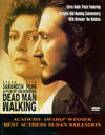|
|
||||
|
|
by Robert Ford  Dead Man Walking is a film about a big issue -- in this case the death penalty -- that does not shove its message down the audienceís throat. Writer-director Tim Robbins attempts to present both sides of the "for and against" argument in a clear, lucid, unhysterical manner. This is that rare thing -- a Hollywood film which does not go out of its way to manipulate the audience and push their buttons. Based on Sister Helen Prejeanís book of her own experiences, the film is about the relationship between Prejean (played by Susan Sarandon) and a death-row inmate who she counsels in the weeks leading up to his execution. Years after his conviction for a brutal rape and murder, Matthew Poncelet (Sean Penn) is still protesting his innocence and trying to secure a pardon. With only a few weeks to go before his execution date, Poncelet believes that Sister Helen can help him lodge a last-minute appeal. She, however, is more interested in making him own up to his crimes so that he can "find" God and redemption before he dies. It is the friction between these two leads that makes the film so compelling. Sister Helen on the one hand is a nun who has dedicated her life to chaste, moral living, while Matthew is a boorish neo-Nazi who feels no remorse for his crimes. Sarandon and Penn really have great chemistry here. And Iím not talking about sexual chemistry -- I mean the easy rapport two good actors can have together. Not since Hannibal and Clariceís verbal sparring through a glass wall has a prisoner-visitor relationship made for such riveting drama. Both leads were nominated for Academy Awards and Sarandon won that yearís Best Actress award. As good as she is in this role, itís not Sarandonís best work, and I canít help feeling that (as is so often the case with Oscars) the award was for her lifeís work rather than this particular role. Itís the kind of subtle, understated acting which does not often win Oscars. A more typical Oscar role from that year would have been someone like Sharon Stone in Casino. Sarandon even "glams down" for the part, wearing dowdy clothes and not a smudge of make-up. The whole film is like this; it's presented straight, without adornment or stylistic flourishes. Blue-tinted flashbacks to the night of the rape and murder represent the movie's one and only concession to cinematic style. Despite the film's unfussy look, it soon becomes clear that Tim Robbins is not really objective or unbiased on the subject of the death penalty. By the end of the movie, his stance against the practice is obvious. In fact, I believe all the main creative forces behind this project -- Prejean, Robbins, Sarandon, Penn -- are in agreement with Matthew Ponceletís last words before his execution: "Killingís wrong, whoeverís doing it." (Released by Gramercy Pictures and rated "R" for a depiction of rape and murder.) |
||
|
© 2025 - ReelTalk Movie Reviews Website designed by Dot Pitch Studios, LLC |



